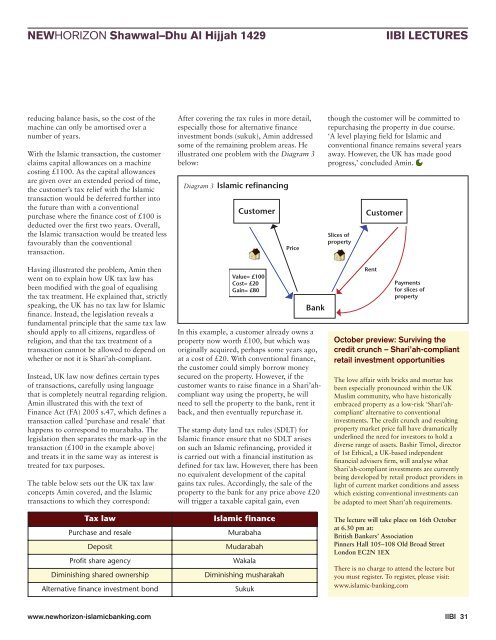azerbaijan: emerging market islamic banking and finance
azerbaijan: emerging market islamic banking and finance
azerbaijan: emerging market islamic banking and finance
Create successful ePaper yourself
Turn your PDF publications into a flip-book with our unique Google optimized e-Paper software.
NEWHORIZON Shawwal–Dhu Al Hijjah 1429<br />
IIBI LECTURES<br />
reducing balance basis, so the cost of the<br />
machine can only be amortised over a<br />
number of years.<br />
With the Islamic transaction, the customer<br />
claims capital allowances on a machine<br />
costing £1100. As the capital allowances<br />
are given over an extended period of time,<br />
the customer’s tax relief with the Islamic<br />
transaction would be deferred further into<br />
the future than with a conventional<br />
purchase where the <strong>finance</strong> cost of £100 is<br />
deducted over the first two years. Overall,<br />
the Islamic transaction would be treated less<br />
favourably than the conventional<br />
transaction.<br />
Having illustrated the problem, Amin then<br />
went on to explain how UK tax law has<br />
been modified with the goal of equalising<br />
the tax treatment. He explained that, strictly<br />
speaking, the UK has no tax law for Islamic<br />
<strong>finance</strong>. Instead, the legislation reveals a<br />
fundamental principle that the same tax law<br />
should apply to all citizens, regardless of<br />
religion, <strong>and</strong> that the tax treatment of a<br />
transaction cannot be allowed to depend on<br />
whether or not it is Shari’ah-compliant.<br />
Instead, UK law now defines certain types<br />
of transactions, carefully using language<br />
that is completely neutral regarding religion.<br />
Amin illustrated this with the text of<br />
Finance Act (FA) 2005 s.47, which defines a<br />
transaction called ‘purchase <strong>and</strong> resale’ that<br />
happens to correspond to murabaha. The<br />
legislation then separates the mark-up in the<br />
transaction (£100 in the example above)<br />
<strong>and</strong> treats it in the same way as interest is<br />
treated for tax purposes.<br />
The table below sets out the UK tax law<br />
concepts Amin covered, <strong>and</strong> the Islamic<br />
transactions to which they correspond:<br />
Tax law<br />
Purchase <strong>and</strong> resale<br />
Deposit<br />
Profit share agency<br />
Diminishing shared ownership<br />
Alternative <strong>finance</strong> investment bond<br />
After covering the tax rules in more detail,<br />
especially those for alternative <strong>finance</strong><br />
investment bonds (sukuk), Amin addressed<br />
some of the remaining problem areas. He<br />
illustrated one problem with the Diagram 3<br />
below:<br />
Diagram 3 Islamic refinancing<br />
In this example, a customer already owns a<br />
property now worth £100, but which was<br />
originally acquired, perhaps some years ago,<br />
at a cost of £20. With conventional <strong>finance</strong>,<br />
the customer could simply borrow money<br />
secured on the property. However, if the<br />
customer wants to raise <strong>finance</strong> in a Shari’ahcompliant<br />
way using the property, he will<br />
need to sell the property to the bank, rent it<br />
back, <strong>and</strong> then eventually repurchase it.<br />
The stamp duty l<strong>and</strong> tax rules (SDLT) for<br />
Islamic <strong>finance</strong> ensure that no SDLT arises<br />
on such an Islamic refinancing, provided it<br />
is carried out with a financial institution as<br />
defined for tax law. However, there has been<br />
no equivalent development of the capital<br />
gains tax rules. Accordingly, the sale of the<br />
property to the bank for any price above £20<br />
will trigger a taxable capital gain, even<br />
Islamic <strong>finance</strong><br />
Murabaha<br />
Mudarabah<br />
Wakala<br />
Diminishing musharakah<br />
Sukuk<br />
though the customer will be committed to<br />
repurchasing the property in due course.<br />
‘A level playing field for Islamic <strong>and</strong><br />
conventional <strong>finance</strong> remains several years<br />
away. However, the UK has made good<br />
progress,’ concluded Amin.<br />
October preview: Surviving the<br />
credit crunch – Shari’ah-compliant<br />
retail investment opportunities<br />
The love affair with bricks <strong>and</strong> mortar has<br />
been especially pronounced within the UK<br />
Muslim community, who have historically<br />
embraced property as a low-risk ‘Shari’ahcompliant’<br />
alternative to conventional<br />
investments. The credit crunch <strong>and</strong> resulting<br />
property <strong>market</strong> price fall have dramatically<br />
underlined the need for investors to hold a<br />
diverse range of assets. Bashir Timol, director<br />
of 1st Ethical, a UK-based independent<br />
financial advisers firm, will analyse what<br />
Shari’ah-compliant investments are currently<br />
being developed by retail product providers in<br />
light of current <strong>market</strong> conditions <strong>and</strong> assess<br />
which existing conventional investments can<br />
be adapted to meet Shari’ah requirements.<br />
The lecture will take place on 16th October<br />
at 6.30 pm at:<br />
British Bankers’ Association<br />
Pinners Hall 105–108 Old Broad Street<br />
London EC2N 1EX<br />
There is no charge to attend the lecture but<br />
you must register. To register, please visit:<br />
www.<strong>islamic</strong>-<strong>banking</strong>.com<br />
www.newhorizon-<strong>islamic</strong><strong>banking</strong>.com IIBI 31
















